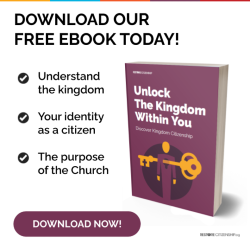What has the church come to when a pastor get's an "Amen" for boldly calling his church members plebs?
Kings and Subjects
History, we should pay more attention to it. Have you heard of the ‘Divine right of Kings’? It was a religious and political doctrine that stated that the monarch (or pope) was subject to no earthly authority and had the right to rule directly from God. As the saying goes “absolute power corrupts absolutely”, and history records the deeds of many tyrannical Kings who behaved as though they were demi gods and their subjects mere mortals. It was this reckless and pompous behaviour that birthed the ‘Magna Carta’ (which later contributed to forming the American constitution), a legal agreement signed June 1215 between the King and his subjects, designed to limit his abuse of power. The Magna Carta stated something very revolutionary at the time it was formed: The King had to obey the law and if he broke it he could be dethroned and replaced. Prior to this, the King ruled as though he were above the law. This weakening of the monarch offered a few more protections for ordinary people.
Politicians and Plebs
So why this crash course in history? Well, not too long ago a senior politician, Andrew Mitchell, was alleged to say: “Best you learn your f****** place. You don’t run this f****** government. You’re f****** plebs.” He was speaking out of frustration when police would not let him cycle through the main gates into 10 Downing Street. There was a massive furore in the media over his alleged statement. A Plebeian was a term used in ancient Rome to describe a ‘commoner’ or a member of the lower social classes. His statement spoke to a period of history where citizens were subjects. The idea that Britain was governed by an elite who secretly held the belief that they ruled as anointed nobles and everyone else were there subjects, was not an idea that would go unnoticed by the public. Whether he said it or not, the very idea that such words were uttered by senior public servants was enough to kick start a media frenzy resulting in his resignation.
Clergy and Laity
Lets revisit history again. I mentioned that the “Divine right of kings” was a religious and political doctrine. Well another powerful religious institution typified this notion; the Roman Catholic Church. In the period commonly referred to as the reformation a man named William Tyndale created the first English bible. Prior to his work the bible was commonly written and read in Latin, the language of the elite and the clergy. “Commoners” could not read or understand it. The Catholic order furiously opposed the translation of the bible into the common tongue. They held that the clergy were of a higher order than the average believer. When Tyndale translated the Greek word “ekklesia” into “congregation” (as he deemed to be a more accurate translation of the word) it undermined and discredited the ideology and administration of the Catholic Church. The idea that the assembly of believers defined the body and not the systemised catholic institution was a radical departure from the status quo. The role of the clergy was further challenged by Tyndale’s translation of the Greek word “presbuteros” to mean ‘elder’ instead of ‘priest’. Elders were from the people and not separate from the people. Many reformers believed in the “priesthood of all believers”, placing responsibility and power in the hand of the ordinary believer to study God’s word and attend to his priestly duties beyond religious practices. They were closing the gap between ‘them and us’. And what price did Tyndale pay for this? Tyndale was publicly defrocked, strangled and burned to death.
Them and Us
Unfortunately one thing we learn from history is people don’t learn from history. As is commonly said, history repeats itself. However it seems Britain still recollects the journey from subjugation under authoritarian rule to empowered citizenship and will not easily except the reintroduction of ideologies such as ‘the divine rights of kings’ as alluded to in words such as “pleb”. It’s quite different amongst the religious, it seems many still hold to the notion that there are a special anointed few who are to rule the unenlightened many. Citizens of the Kingdom seem to be less in tune with their history. Today a pastor can boldly call his church members ‘plebs’ and receive a hearty “amen”.
1 Peter 2:9 - 'But you are a chosen people, a royal priesthood, a holy nation, a people belonging to God…'


